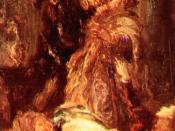In Shakespeare's Hamlet, a very clear moral order is established as the protagonist, Hamlet, completes his journey through the phases which define a Shakespearean tragedy. The play begins with Hamlet encountering his father's ghost, at which point he learns his father had in fact been murdered by his own brother, Claudius. It is Hamlet's wish to avenge his father that causes all other moral dilemmas in the play, and this is what defines the play's particular moral order: As the play progresses, the gravity and seriousness of Claudius sins lessen, and Hamlet's grow, although never reaching the moral plateau on which Claudius rests. In the beginning of the play, Hamlet is morally 'in the right', always taking precautions to ensure this remains so. Claudius, on the other hand, not only murders Hamlet's father, but then plots to do away with Hamlet as soon as he feels threatened. As the play progresses, Hamlet continues attempting to right the original wrong, but only succeeds at the finish, with Claudius' death.
Hamlet's words in Act III, Scene IV -- 'thus bad begins, and worse remains behind' illustrate the moral order well; the actions against him were wrong, but, to a lesser extent, so was his revenge.
Near the start of the play, The Ghost tells Hamlet of the crime committed by Claudius. When Hamlet finds out his father was murdered by his own brother, who then stole his wife and crown, he immediately commits himself to avenging the murder; 'Haste me to know't, that I, with wings as swift/As meditation or the thoughts of love/May sweep to my revenge.' At this point, Hamlet is completely justified in his feelings, and most would agree that his revenge is morally right. Although the act of murder itself is wrong, an 'eye...



Theme
Good essay. I've got to do a close reading of Hamlet, focusing on a major theme/character/etc.
There is a lot of stuff on the themes of revenge and murder, but looking at the theme of moral order and balance is something I hadn't thought of before.
0 out of 0 people found this comment useful.